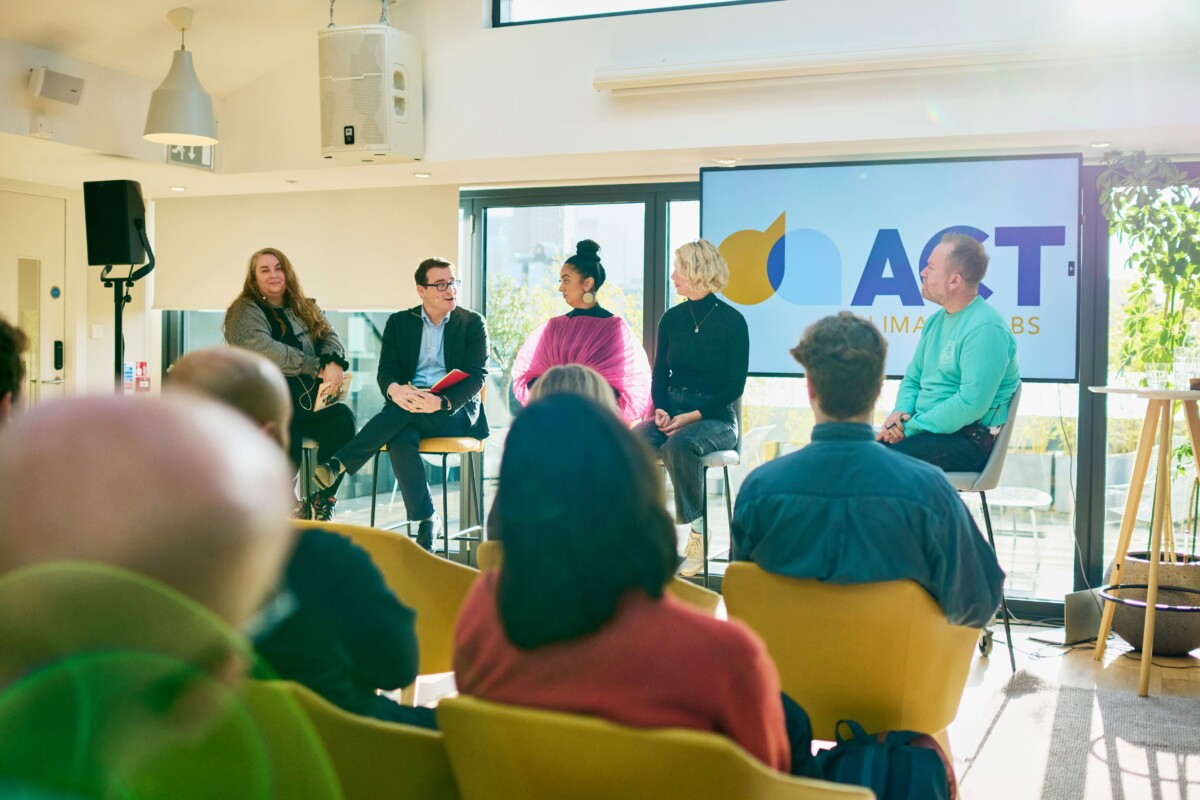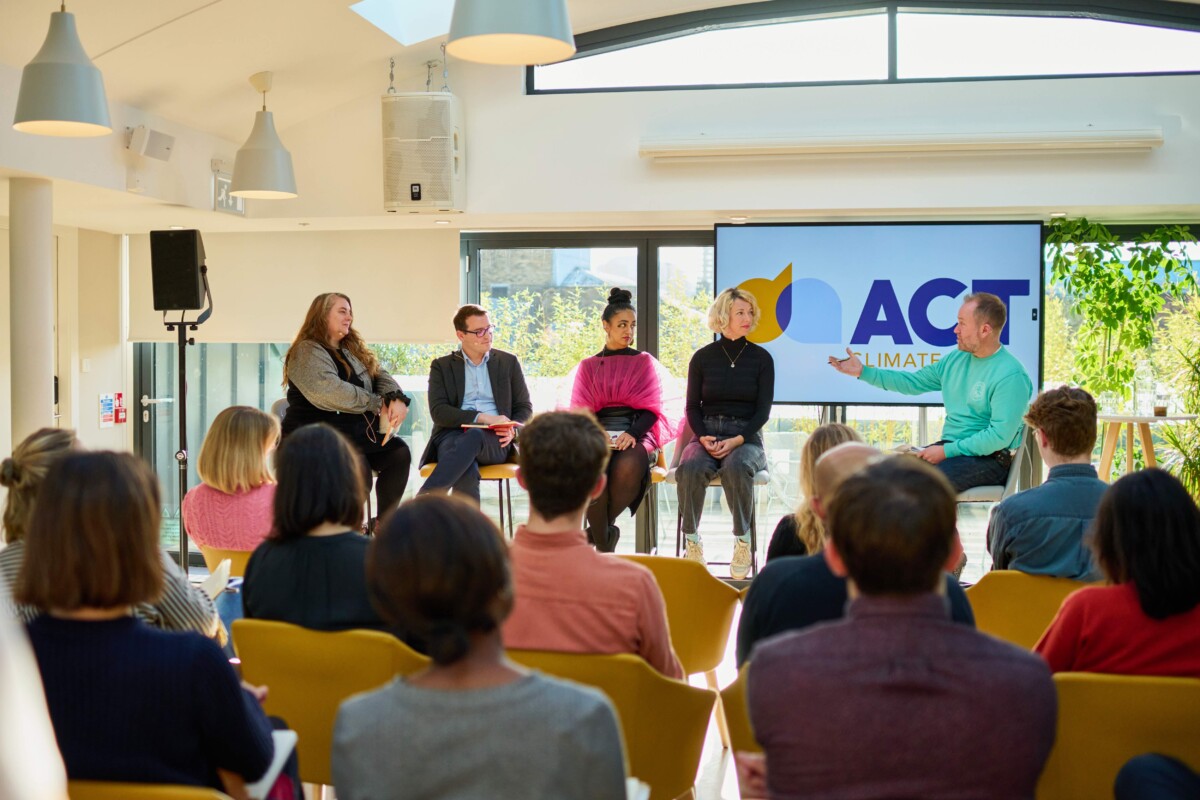In an era where disinformation poses a significant threat to communication and public trust, philanthropic and charity organisations find it harder and harder to land their key messages in a polluted information environment.
At a recent event, hosted by ACT Climate Labs, key figures from the philanthropic and charity sector gathered to address the pressing issue of misinformation and its impact on climate-related initiatives.
The event emphasised the need for adaptation in communication strategies and the use of advertising to counteract the spread of misinformation, particularly in the context of fundraising efforts, critical missions and public support.
The panel, consisting of Hirra Khan Adeogun (Co-Director, Possible), Louise Brown (Supporter Relations Coordinator, Friends of the Earth), Christopher Hammond (Chief Executive, UK100), and Harriet Kingaby (Head of ACT Climate Labs), offered insights into the challenges faced by NGOs in an era dominated by disinformation.
Jake Dubbins, Managing Director of Media Bounty, chaired the event.
Global impact of misinformation
The discussion opened with a stark observation on the global impact of misinformation.
With two billion people globally heading to the polls in upcoming democratic elections next year, the threat of misinformation undermining these processes was highlighted. The panel stressed the urgent need for addressing misinformation, citing the Intergovernmental Panel on Climate Change (IPCC) acknowledgment that misinformation is a significant barrier to timely climate action.
Recent polling data revealed a significant gap between public perception and the reality of climate change and preparedness for its impacts. Only 5% of Brits feel adequately prepared for the consequences of climate change, highlighting the urgent need for effective communication strategies to bridge this awareness gap.
Challenges at local council level
Christopher Hammond, representing UK100, a coalition of 110 councils committed to achieving net-zero emissions, shed light on the challenges faced at the local council levels.
While councils are often trusted institutions, misinformation campaigns, ranging from leaflets to death threats, have become widespread. Hammond expressed concern that the growth of myths and disinformation is hindering local climate initiatives, creating a ripple effect of fear and hesitation among councils.
The impact of misinformation on organisations was further explored by Harriet Kingaby at ACT Climate Labs. She highlighted the wide-ranging consequences of misinformation, from inhibiting political leadership to affecting the mental well-being of frontline staff. The panel agreed that misinformation not only undermines public trust but also poses a substantial obstacle to achieving the necessary social and political changes.

Era of misinformation needs different media strategies
She also stressed that NGOs needed to change their media strategies in an era of misinformation. Strategies which currently rely on PR and their own social media channels are no longer enough when faced with a hostile press environment and social media platforms rife with misinformation. NGOs must additionally invest in advertising campaigns (and not rely solely on social media) that leverage trusted influencers and advertising methods to change narratives.
The discussion then turned to practical solutions, with the emphasis on the role of philanthropy and charity organisations in mitigating the impact of misinformation. The panellists stressed the importance of supporting political leaders and providing them with the necessary tools, inspiration and language to navigate the complex landscape of climate action. The need for a collective effort, including legislative measures on social media platforms, was underscored as a crucial step toward combating misinformation effectively.
Challenges faced by NGOs
The challenges faced by NGOs like Possible and Friends of the Earth were articulated by Hirra Khan Adeogun and Louise Brown. Adeogun highlighted the difficulty in conveying complex climate solutions to the public and the persistent misinformation campaigns on social media.
Organisations, such as Possible, faced personalised attacks on social media platforms, contributing to the spread of false narratives and making it difficult to convey evidence-based climate solutions. The panel shared instances of climate activists, such as Vanessa Nakate, facing relentless bullying and intimidation on social media. This highlights the urgent need to address online harassment and protect those on the front lines of climate action.
NGOs dealing with trolling and negative responses on social media
Louise Brown from Friends of the Earth shared the challenges faced by supporter relations teams dealing with a barrage of negative comments on social media. The impact on team morale and wellbeing, coupled with the need for safeguarding measures, poses significant concerns for organisations engaging with the public.
The event wrapped up with a call for a concerted effort to support political leaders, rethink communication strategies and address misinformation at its root. The philanthropic and charity sector was urged to play a pivotal role in fostering resilience against misinformation, ensuring that climate initiatives are not derailed by a gap between public perception and the urgent reality of the climate crisis.

In navigating the sea of misinformation, the ACT Climate Labs event laid the groundwork for collaboration and action, emphasising the critical role of philanthropy in countering misinformation and restoring public trust in climate-related efforts. The disconnect between scientific jargon and public understanding contributes to the spread of misinformation, necessitates a shift toward clearer and more accessible communication strategies.
By navigating the complexities of misinformation, philanthropic organisations can fortify their missions, restore public trust and contribute to meaningful progress on global issues, particularly the climate crisis.
Navigating the future: mitigating challenges
Addressing the multifaceted challenges posed by misinformation requires a strategic and collaborative approach from philanthropic and charity organisations:
- Legislation and Social Media Responsibility: Panellists emphasised the need for legislation to regulate social media platforms and curb the spread of misinformation. Drawing parallels with the call for AI regulation, there was a consensus that legislative measures are essential to safeguard democratic processes and public discourse.
- Supporting Political Leadership: Acknowledging the loss of political capital and courage resulting from misinformation campaigns, the importance of providing comprehensive support to political leaders was emphasised. This support extends beyond institutional measures to include mental well-being and public affirmation for leaders championing climate action.
Organisations like UK100 stressed the need for a change in thinking in engaging local governments. This involves providing practical tools, inspiration, and support tailored to the time constraints of part-time councillors. Clear and accessible communication strategies can aid in conveying the benefits of climate interventions without contributing to misinformation.
- Prioritise Persuadable audiences: As a key demographic to influence ‘Persuadables’ –account for roughly 69% of the UK population who are neither climate deniers nor climate activists. Expand communication strategies and campaigns to include this untapped audience and engage and inform this group effectively where they are and in language they respond to.
By investing in research and outreach campaigns tailored to Persuadables, philanthropy can help shift public perception on critical issues. This approach aligns with the principles outlined in the ACT Climate Labs advertising guide, emphasising the importance of strategic messaging and audience segmentation.
- Collective Action and Public Support: The panellists emphasised the significance of collective action and public support. Philanthropic organisations can play a pivotal role in mobilising support for leaders committed to climate action. Celebrating positive initiatives, amplifying public endorsements, and fostering a sense of community engagement are essential components of combating misinformation.

Kathryn Bonner joined ACT Climate Labs as Account & Partnerships Manager in 2021 where she works with the team to supercharge the effectiveness of climate communications through advertising.
ACT Climate Labs is a group of advertising and climate experts who understand how misinformation undermines climate crisis communications. It aims to supercharge the effectiveness of climate communications using advertising to make climate action mainstream.
ACT is a collaboration between ethical advertising agency Media Bounty, seasoned climate campaigners, disinformation researchers, measurement experts and journalists – as well as over 200+ members from across the climate, NGO, cultural and sporting sectors.
Follow ACT on LinkedIn.
from UK Fundraising https://ift.tt/5XwmDOs
0 comments:
Post a Comment